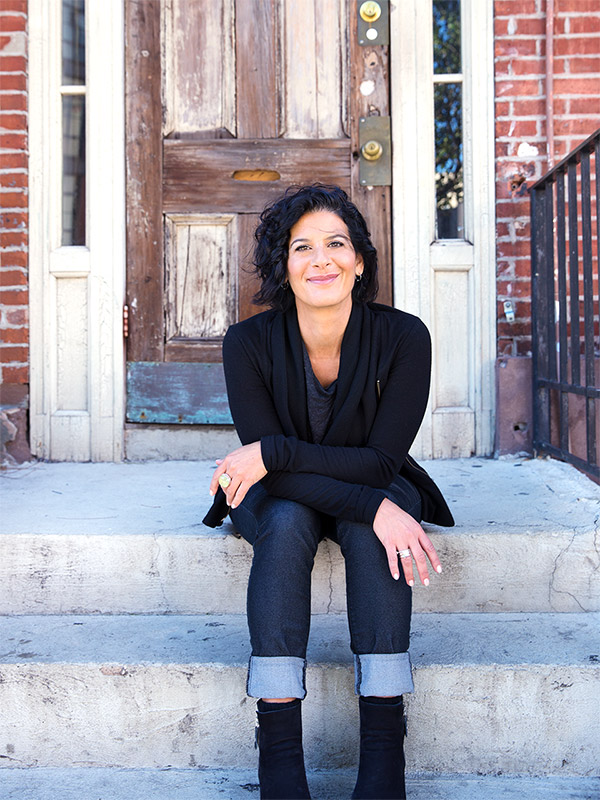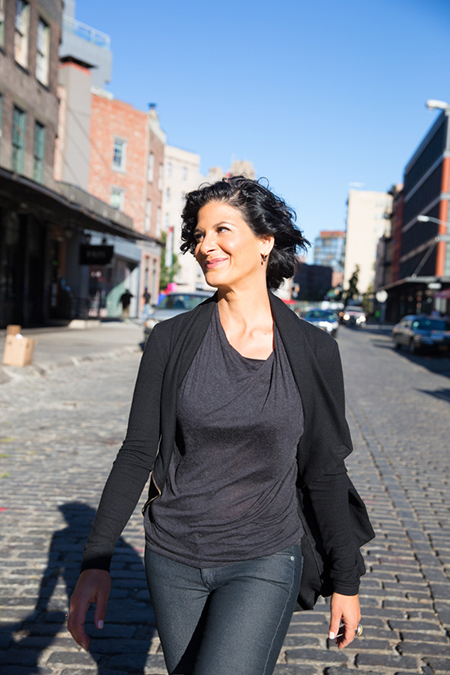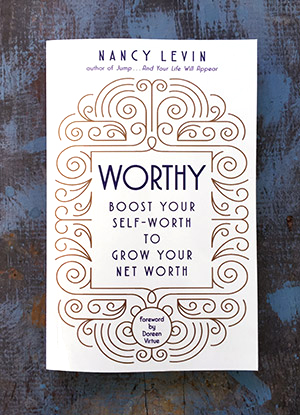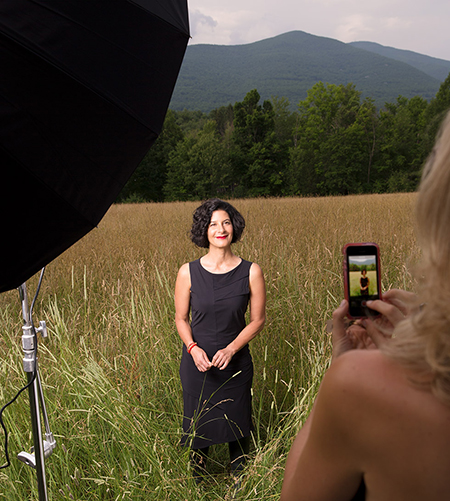
Nancy Levin
#Worthy
Interview by Kristen Noel, July 7, 2016, Woodstock, NY
Photographed by Bill Miles in Woodstock and Manhattan, NY
Our present moment choices are our crystal ball.
Nancy Levin
_____________________
Watch the full interview video:
Kristen:
Nancy Levin — my beautiful friend, bestselling author of three books (one literally hot off the publishing presses — Worthy: Boost Your Self-Worth to Grow Your Net Worth — we’ll get to that in a moment), host of your own radio show, Master Integrative coach, speaker, poet (with a master’s degree in poetry and creative writing, I might add), and all around amazing creative re-inventor. Your story is really a testament to what is possible when we have the courage to leap and a willingness to own our worthiness. I’m honored to have you here today. I thank you for sitting down with us — and welcome you to my living room.
Nancy:
Thank you, Kristen. It’s a deep honor for me to be here with you as well.
Kristen:
We have known each other for three years, and a poignant three years it has been — a magnificent arc to witness. I do want to go back for our audience and tell the story of your life to this present moment. Let’s have some fun today and insert a little hindsight is 20/20 perspective, and maybe share this story in a different way. So, if you would be willing…
Nancy:
I’m game.
Kristen:
Okay, so I’m going to give you a sentence to complete.
Nancy:
The ‘Mad Libs’ game of my life.
Kristen:
Once upon a time, there was a girl who had a dream job, 12 years as the Event Director at Hay House, to be exact, and one day…
Nancy:
She wanted to come out from behind the curtain and stand center stage.
Kristen:
Previously, she had been…
Nancy:
Managing the perceptions of others, giving other people the lens to see her through, and operating from the motto of, “Never let them see you sweat,” chasing the gold stars, seeking external validation, and really being run by her perfectionism.
Kristen:
That was a lot to manage — more than a full-time job.
Nancy:
Very much so.

Kristen:
One day…
Nancy:
She jumped.
Kristen:
What made her jump?
Nancy:
The deep knowing that her worth and value was no longer being determined by others, that her worth and value was no longer being given to her — it actually isn’t anything that can be given or taken away.
Kristen:
Everything looked perfect on the outside, in the professional realm. She was the one that kept it all together for others. She managed the behind the scenes. She was the one who fixed things; but one day her personal life fell apart.
Nancy:
Yes. I hit the moment of my own dark night of the soul, hit my own crisis, hit my own point where I knew that I had a choice of either going back to sleep and falling back into the life I’d been living — or I could get about the business of making major change. For me, the experience came out of such a catastrophic shock that I knew I needed to take responsibility for my own life. I had the choice to propel myself into something different, or not.
Kristen:
Let’s just roll it back for a second — that catastrophic event was…
Nancy:
My now ex-husband reading my journals.
Kristen:
And you had been married for how long?
Nancy:
Nearly 18 years.
Kristen:
You had really been hiding behind the shadows for a long time.
Nancy:
Hiding and really fearing any sort of exposure. I didn’t want anyone to see me in any other way than as Superwoman. A completely manufactured persona.
Kristen:
Right, but think about how we all do this on some level.
Nancy:
We all do this.
Kristen:
Where does that come from?
Nancy:
On the most basic level, I believe that we all think we need to hide some aspect of ourselves in order to be loved and accepted.
This begins very early on because we start absorbing information about ‘good and bad’ and ‘right and wrong’, and we start seeing qualities in ourselves that we don’t want to identify with, so we actually start disowning those certain qualities. When I say we’re hiding something, it can be a skeleton in the closet, or it can be a certain aspect of ourselves, a quality that we want to dis-identify from. But, here’s the thing — we all want to be loved for who we are.
We’re all running around saying, “Just love me for who I am,” but we don’t reveal who we are.
Kristen:
The ultimate irony of ironies, right?
Nancy:
Yes…I’m going to put on my armor…
Kristen:
…and hide the real me away. And then there are the layers upon layers of this subconscious stuff…
Nancy:
That goes all the way back to these limiting shadow beliefs that are formed in childhood. When we’re under ten years old, events and circumstances occur that we’re too young to process and digest in a healthy way. We make them mean something about us, and we start drawing conclusions about ourselves. This is where the beliefs start forming: I’m not enough. I’m not good enough. I’m not lovable. There’s something wrong with me.
What I have seen in my own life, and in the lives of the clients I coach, is that what’s funneling down from all of these beliefs is, at the core, I’m not worthy. I’m not worthy of love. I’m not worthy of money. I’m not worthy of happiness. I’m not worthy of taking time for myself. I’m not worthy of freedom.
Kristen:
Let’s go back to your journal story — a pivotal moment that felt like the worst exposure you could have ever felt.
Nancy:
It was the most exposing thing because he actually threatened to expose me.
Kristen:
So, not only did he read them, but he was going to then let others read them as well.
Nancy:
Right. He said, “I’m going to share them with your friends, your family, your coworkers.”
Kristen:
I can only imagine that in that moment you felt like, “I’m never going to write another word again.”
Nancy:
I didn’t for nearly two years.
Kristen:
How many journals did you have at the time?
Nancy:
Over seventy volumes. Since I was eleven years old, I’d been keeping a journal, and the day after he read them, I actually destroyed all of them, over seventy volumes.
The moment I walked through that door and saw him holding four in his hands, I thought, okay, did he only read those four or did he read seventy? I was operating from such a place of fear, and reacting to his rage, and to his controlling nature, which I had lived with for all that time, and had gotten very accustomed to — in that moment, I wanted anything that was written down to be gone.
Kristen:
How many years ago was that?

Nancy:
That was April of 2008, eight years ago. And yet, it feels like it was yesterday.
Kristen:
Yesterday and a lifetime, right?
I bring that up not to rehash that situation, but to highlight where you were, how you awoke, and where you are presently. As I hear you speak — I want to go out on a limb and ask you, given where you stand now, from this vantage point — can you honestly say, “I’m glad this event happened so that I woke up to become who I was meant to be?”
Nancy:
I can, because what I recognize is that I ultimately set a bomb in my journals, to detonate years later.
Now I have deep gratitude for the fact that he read my journals — because if he hadn’t, I know I would probably actually still be in that marriage. I would never, in a million years, have the life I have right now.
I would still be stuck, and I would still be trying to, as Brené Brown says, “hustle for my worthiness.” I would still be trying to prove myself. I would still be trying to earn my value in all the wrong ways. The big crossing over for me was around taking responsibility, to no longer be pointing at anything outside of me, or looking at anything outside of me, and to realize that I have a role here, too. I co-created the dynamic between the two of us. I remember after I left, as I was doing so much inner work on myself, as I was growing and evolving — there were moments where I thought, “I could go back into that marriage now because I’ve grown more.”
Kristen:
Interesting.
Nancy:
Ultimately, I realized that there was no possible way that this me could be in that marriage.
Kristen:
It’s sort of like someone that goes into recovery.
Nancy:
Right.
Kristen:
If there are two alcoholics, and one goes into recovery, there is usually no coming back together.
Nancy:
I knew that it was no longer about saving him, or fixing the marriage. It was only about healing myself, because that’s all I have any control over anyway.
Kristen:
I met you at this key moment. I didn’t even know what was happening in your life at that point. The way I would describe that, looking back now, is that I feel like you were standing at the tippy edge of a very high diving board. You had toes creeping forward, still hauling some baggage — you were still in the old job, and you were looking ahead. I remember that you were still operating as the Event Director at Hay House, but they were also pushing you out onto stage saying, “Please, read this incredible poetry.” I remember you went up there, and it was so inspiring, but you hadn’t fully owned it yet. You didn’t realize how amazing you were.
Today, your story is igniting that possibility in other people — igniting that awakening.
Nancy:
So much is entwined in desire and allowing — and how we can invoke what we believe to be impossible and alchemize it to become possible. As you said, I was up there hosting and overseeing all these events in front of thousands and thousands of people. But it’s very different to say, “Here’s the lunch break,” or “The bathrooms are over here,” or introduce Wayne Dyer or Louise Hay or Marianne Williamson, etc. Very different to do that than it was to actually go up and start bearing my soul.
This was a big turning point in this whole worthiness aspect: Taking my place, owning my place, and delivering what was in my heart.
And yet, I thought, “Who wants to hear my poems? Who wants to hear about what I’m going through?”
Kristen:
Every book is already written. The shelves of bookstores are filled.
Nancy:
Right. Who’s going to relate to this?
I’ll never forget the first time that someone came up to me after a conference and said, “I thought I came here to see Wayne Dyer, but I came here to hear that poem.” It was a revelation for me.
Kristen:
I remember your face when I went up to you at a Writer’s Workshop three years ago and told you that you were the person I was most excited to meet that day.
Nancy:
And I was like, “I am? I’m nobody.”
Kristen:
You’re everybody.
Isn’t it incredible when we can look back and say, Wow, I was so different, and I wasn’t owning these various aspects of myself. But it’s about putting one foot in front of the other, because as soon as you make that one step on behalf of yourself, then it just keeps going.
Nancy:
It’s true, it keeps going because we put ourselves into the space of being able to be OK with the unknown.
Kristen:
That’s a biggie.
Nancy:
So many of us want to cling to certainty, or some sense of security, and what I’ve seen time and time again is that the unknown is where possibility and opportunity are born. There’s that saying, “Our best thinking got us here.” So we have to be open to something beyond ourselves, and for me, a big turning point came when I was willing to actually ask for help.
Kristen:
That’s what I was going to ask you, because here you were. First of all, you were working with some of the greatest minds in the self-empowerment space.
Nancy:
I was, but was I taking it in?
Kristen:
I think you were taking it in via osmosis.
Initially, you weren’t revealing what was going on in your personal life. When did you finally say, “This burden is just too much for me to carry. I need to share this. I need to come out with this. I need to crack open and start creating this space for myself to emerge.”
Nancy:
It happened very slowly over time. I had to get ‘right’ with myself, to be with the truth inside of me before I could actually open up to allowing other people into my world. As I did, what I found is that the people I feared revealing myself to the most were the ones who rallied around me the fiercest.
It wasn’t until I reached a place where I was no longer judging or shaming myself that I could actually reach out for guidance.
It was beautiful, because I have this image of these people, my close friends, my family, a lot of my Hay House peeps, really becoming a scaffolding around me as I rebuilt myself from the ground up.
Kristen:
That’s a beautiful image.
And while you were doing that healing, you were also sort of a secret undercover agent, because you were writing away.
Nancy:
Yes.
Kristen:
And you were also becoming a coach? Your transformation was underfoot. When did that initiate? When did you start taking those action steps?
Nancy:
In 2010, as I was preparing to get divorced, two of my co-workers at Hay House asked me to write a poem for their wedding ceremony.
That’s when Reid Tracy, the President of Hay House, former Best Self cover boy, said, “Oh, my God. You’re like a real poet.”
Kristen:
I have a master’s in poetry. Hello?!
Nancy:
That’s exactly what I said, so that’s when he started saying, “Okay, let’s do something. Start sharing your poems. Start sharing your story.” We were putting together the programming for a new conference when he turned to me and said, “Put yourself in a spot for a keynote.” I nearly hit the floor, because I couldn’t even imagine that I was going to get up on the stage and talk.
I didn’t even know that this was really something that had been percolating in me until it was underway.
Kristen:
Until it was quite literally bubbling over — and until you allowed it.
Nancy:
And until I said yes to the opportunities that presented themselves.
At that point Reid said, “Why don’t you put together a book of your poems?” Not that Hay House was going to publish it, because as Reid loves to say, it’s just poetry. [smirking]
I self-published that first book. That was fine and good and then Reid said to me, “Now you need to write a real book.”
Jump… And Your Life Will Appear was released in March of 2014. During that time, I decided to do a yearlong coaching certification with my dear friend and mentor, the late Debbie Ford. Not because I wanted to coach. I just wanted to do the deep internal excavation` and learn more about myself to help myself heal.
Kristen:
Little did you know…
Nancy:
Little did I know that I would be unrecognizable on the other side of it, and that I would actually be infused with a deep desire.
Kristen:
A fire.
Nancy:
Yes, with a deep fire to help other people get free.
Kristen:
…and spark their own fires — beautiful.
Nancy:
That was really the beginning of me even having the inkling that I might want to leave my ‘dream’ job, and start something on my own.
Kristen:
It was time to create your next ‘dream’ job.
Nancy:
It was during that time that I went to Reid and said that I wanted to quit my job. He literally said to me, “I’ll tell you when you can quit your job.”
Kristen:
I love that story.
Nancy:
It’s hilarious, but it’s true. Again, I’m so grateful.
Kristen:
Your scaffolding.

Nancy:
Yes. He is brilliant, and he could see for me what I couldn’t see, which is what I now take on in my coaching with my clients. I play that role for others, yet I wasn’t playing it for myself. That’s really what he was for me, believing and seeing something in me that I couldn’t hold for myself quite yet. “Don’t leave this job until you really have built up your coaching practice, until you publish this next book, until you have a firm foundation under you, so that when you leave, you’re not in a place of desperation, or you’re not feeling resentful or fearful.”
Kristen:
You were working double time in more ways than one. You had a full-time job, but you were doing this other thing on the side — heeding a soul calling.
Nancy:
Yes.
Kristen:
We need to remember that sometimes things don’t have to come in dramatic fashion or as a result of a big explosion. We can simply be stuck in a relationship, stuck in a job, or just stuck in some aspect of our lives. Your story reminds me of a Wayne Dyer quote: “Don’t die with your music still in you.” You had a symphony that was just trying to bust a move, right?
Nancy:
I did. The thing that was revealed in those journals was that I’d had an extramarital affair eight years prior. At the time, I felt that it was my only way to give myself the experience of feeling love. I was in a marriage that was completely filled with rage, and I was completely filled with fear. I really had to package myself on a daily basis to be digestible to him, and…
Kristen:
…it didn’t matter what it was doing to your insides.
Nancy:
Didn’t matter at all, so I was constantly in a role that I put myself in, where I was completely living in reaction to him, and always driven by, “What can I do to make sure that everything’s okay for him?” I can now see that this goes back to the fact that I had a brother who was ill and died when I was very young. I was two years old when my six-year-old brother died — and I took on this role of trying to heal a grief in my parents that could never be healed.
Kristen:
Did you make these personal discoveries through your coaching?
Nancy:
Yes. Through the work with Debbie Ford, through the deep shadow work, I was actually able to go back and see what happened when I was two, what I made it mean about me.
Kristen:
Powerful.
Nancy:
And then I went out into the world and on the day I met my husband, it was as if he said to me, “Hi. I’m broken,” and I said, “Great. I’m Superwoman. I will fix you.” Our core wounds were a match made in heaven — yet all along, I was still trying to save my brother in him.
Kristen:
Right, so we’re really talking about transference.
Nancy:
Absolutely.
This is what we do. Until we heal something, we continue to draw it into our lives as another opportunity to heal.
Kristen:
If someone isn’t experiencing something grandiose, but there’s some baseline malaise — what is the first question they need to ask of themselves, to take stock, to take a pulse of where they are?
Nancy:
I love that you’re asking me this. There’s a fabulous exercise in this book, Worthy, called “50 Desires.”
I had been completely putting my wants and needs aside to enable everyone else’s wants and needs. Everything at work, everything at home, all I was doing was taking care of everyone else’s wants and needs.
Kristen:
You downloaded: That’s my job and I’m going to be the best at that.
Nancy:
I’m going to be the best!
Kristen:
And you were.
Nancy:
I was. My God. I was.
Kristen:
You’re lucky it didn’t make you sick.
Nancy:
I’m very fortunate, because it’s going to come out one way or another. So, this is the thing — when we don’t tell the truth to ourselves, the truth will come out sideways. If we go back to the journals — I couldn’t at that time come forward in my marriage and say, “Hey, I want out,” so I did a very sideways thing in my marriage. I’m not sitting here advocating infidelity, but I also can now have compassion for who I was then.
Kristen:
It was also setting another bomb.
Nancy:
This is the thing. We create our own chaos. People don’t like to own that.
I know that I created my own chaos. Now, on the other side of it, I’m able to be grateful for it, because all of those experiences ultimately are opportunities. I know that we hear this all the time, and it sounds corny, but it’s true.
The other big experience that informed this was my divorce mediation because I was the breadwinner. We went into the divorce mediation with my lawyer saying to me, “Our stance is no maintenance.” Then after meeting with him and his lawyer, the mediator came into the room and said, they want X dollars a month for seven years.
Instead of my lawyer saying, “No. No maintenance…” He started negotiating a package, and in that moment, I didn’t know what to do. And so I didn’t say anything.
Kristen:
You know what to do now! Right?
Nancy:
Yes, but I didn’t know what to do then, so I didn’t do anything. I ended up agreeing to a divorce settlement that had me paying a lot of money, covering his debts, giving him a piece of property, setting him up for a substantial amount of time to continue not even having to work. All of this because I couldn’t stand up for myself, I couldn’t stand in my own self worth, and I couldn’t see the ways in which I was continuing to abandon myself for the sake of another.
Kristen:
At least you knew that it had to shift.
Nancy:
It was a Catch 22. I would never have gained the knowledge and the fierceness around it had it not happened. It had to happen exactly as it happened for me to learn.
This ‘worthy me’ would have immediately said to the lawyer, “Hey, time out. We’re not doing this. Nope. We didn’t agree to this.”
Kristen:
That was the excavation of some big shadow beliefs as well, right?
Nancy:
Huge shadow beliefs. Still trying to protect him, or take care of him, or fix him, or save him…
There are so many women I coach who are going through divorce. Even if they stand to get a lot of money, they’re willing to let that go because they just want to have it be over and done with — and to make sure that they’re not hurting anyone, or taking too much. It’s interesting, because I’ve also coached a lot of women who are on the other side of that equation, fighting for money — and they still push the money away because they just want it to be over with.
Kristen:
How could you really work with these women if you hadn’t walked through the coals of that same fire?
Nancy:
I remember when I wrote Jump and first started speaking about it. I thought, “I can’t get up on stage and just tell people what to do. All I can really do is share my own story, share my own experience, share the experiences of clients I’ve coached, and provide a roadmap, provide a compass to get through the chaos.”
Kristen:
Like our friend Gail Larson always teaches, we hear best through story.
Nancy:
We do.
Kristen:
We hear through the authentic sharing of another person’s story — so that is in fact the most powerful thing you can do.
Nancy:
Yes.
Kristen:
The word ‘worthy’ itself is just luscious. We need to take a deep breath and take that in. Worthy. Who couldn’t use a big ‘ol dose of that? I didn’t realize initially that this was a book about self-worth and net worth. I thought, Whoa, girl. You’re taking on two serious, highly-charged, hotbed issues, bringing money and net worth into the spiritual conversation. I want to know, what was the moment when this clicked for you. Was it the divorce negotiation?
Nancy:
It was. That was when I realized that the self worth piece and the net worth piece were so intertwined for me, even about my beliefs. I was very fortunate growing up. My family had money. My parents paid for school for me. I didn’t go hungry. I wasn’t wanting for anything. I was very well taken care of as a child.
Kristen:
And very responsible.
Nancy:
Hyper responsible. Straight A student. I earned my being taken care of. I worked very hard, and when I met my now ex-husband, he came from a family 180 degrees from mine.
I really felt a strong urge to make up for what he didn’t ever have. I really wanted to be able to give him experiences that money could buy.
Kristen:
So where do you think that comes from, because that’s a common thread? What would be the emotion that is attached to wanting to give someone something they don’t have — for the wrong reasons?
Nancy:
For the wrong reasons. That’s really the important point to make.
For me, I think there was some sort of guilt or shame that I had it so good. This is the thing — we think life is a zero sum game. We think that if we have, it means someone else won’t have.

Kristen:
There’s a bucket, and it’s this big, and that’s it.
Nancy:
There’s some finite amount of whatever.
Kristen:
Right, so where do you think that comes from?
Nancy:
I think it comes from whatever it is back in childhood that we made these commitments around — or the ways that we chose to feel safe and make sense of the world around us. We’re imprinted with our parents’ beliefs, first and foremost, because that’s what we heard.
Kristen:
You suggested that maybe if we spent as much time on what could be, as opposed to all of these limiting scenarios, we could flip that game board.
Nancy:
Yes. We have this negative bias in the brain. It has been proven now by scientists that we default to the negative. There has to be a willingness to rewire, and a willingness to flip that switch around, so that we can actually look into what will be empowering and positive, instead of dis-empowering and negative.
Kristen:
This book is really empowering, and the praise for this book reads like the Academy Awards of self-empowerment. I don’t think there’s a name that’s not in here. And you’re worthy of it, Sister!
Nancy:
You know what? I’ll own it. I’m very grateful, and I believe the book deserves it.
Kristen:
I obviously love hearing your own story thread throughout, but I also love the sharing of your clients’ stories and the diversity of those stories. There’s really something in here for everyone. I was laughing to myself as I read your book because when I think of money problems, I think, there’s not enough, or I need more, or I have too much debt, but I never think, I have money, and that’s a problem. Can you speak to that and talk about frozen vegetables?
Nancy:
After I had this whole situation with the divorce settlement and having to pay all this money, I was then able to start saving again. I was amassing what I felt was a significant sum of money, and it was sitting in a savings account at a regular ‘ol bank.
At this point, I was not the least bit concerned about interest or the stock market, and investing felt like gambling to me — it’s terrifying to me. Essentially, I was just hoarding money out of fear. Something shifted for me when someone gave me the name of a financial advisor. Initially I thought, “Oh, I thought you had to be a millionaire or billionaire to have a financial advisor. I got on Skype with her and she gave me this brilliant analogy:
That hoarding this cash in a ridiculously low interest-bearing account was like planting frozen vegetables and expecting them to grow.
It hit me over the head like a two by four.
Kristen:
Sometimes, we just need a good metaphor to get it.
Nancy:
It completely landed for me. She was brilliant because she met me where I was. She suggested, “Let’s look at paying off your mortgage.”
Kristen:
I love that.
Nancy:
She said, “Over the next 20 years, you’re going be paying this much money in interest. If you even take a piece of this money you are hoarding and pay off your mortgage, that is a huge investment and savings.”
Kristen:
The beauty of this book is that it’s tactical and it’s practical. You’ve got the personal shares. You’ve got beautiful affirmations at the end of each chapter. But all of that aside, I want to talk about these exercises, because this, I think, is a really important thing. As I’m a self-professed self-help, self-empowerment book addict — sometimes I can talk my way around things and think, “Oh, I read that. I don’t need to do that exercise.” But just do them!
I am working through those exercises right now and they are amazing! In the beginning I thought, “Oh, I know this. Yeah, I know. Mother, father, I got this” and then boom. I had a revelation.

Nancy:
In writing this book, I started a beta group of former coaching clients. I needed to see if this process worked — to see the work in action, to really see that it was a proven process. I took them through this process over a period of nearly three months, and I have to say, the most miraculous things began to shift. Over time, this group of women has started businesses, left marriages, gotten married, written books, and started new things.
They all did the “50 Desire” exercise that I mentioned earlier. This group is still active on Facebook together, still tracking their desires.
Kristen:
Holding each other accountable.
Nancy:
It is magnificent.
Kristen:
Let’s talk about the basic tenet of self worth/net worth and how they relate. Encapsulate the overarching premise.
Nancy:
The overarching premise is this: When we think that we are not enough, or we’re not good enough, we also fear that we won’t have enough. And this fear becomes a self-fulfilling prophecy. We set ourselves up in such a way that we don’t actually expand our ‘having-ness’ level. We don’t actually allow in the full richness that life has to offer.
When I speak about net worth, I’m not just talking about bank accounts.
I am talking about the full juiciness, richness, yummy-ness of life.
Kristen:
One thing that always comes up for me when looking into this work is that these beliefs that we’ve processed and carried throughout our lives are deeply buried, but actually so basic.
Nancy:
It’s critical to uncover these beliefs that have been obstacles standing in our way, because at the end of the day, we’re really the only one standing in our own way.
Kristen:
And we’re really the only one who cares about it. Chances are that when we are so worried about what everybody else may think, they are wrapped up in their own lives.
Nancy:
Oh, my God. Let me tell you. No one cares that I had an affair. When I would tell people, “He read my journals and found out I had an affair eight years ago,” their response would be — “He read your journals?!”
Kristen:
It’s how big we make it. It’s how much we carry — and the longer you carry it, the further it gets buried.
Nancy:
Exactly. Because we’re muscling through.
All of those shadow beliefs — I’m not lovable. There’s something wrong with me — are the beliefs that we go out into the world with. Then we actually draw towards us people, places, situations, and circumstances that reinforce those beliefs.
Kristen:
People get very defensive when you bring the self worth/net worth constructs into the same equation. It presses a nerve.
Nancy:
They do, and what I find around this conversation, too, is how many people are still living with a lot of magical thinking. I’ll be the first one to sit here and say I’m not a big believer in manifesting — because I believe that it has to be backed by action.
Kristen:
How about action steps sprinkled with a little faith?
Nancy:
The first chapter in the book — and step one in the coaching — is appropriately titled, “Take Off The Blinders.”
Kristen:
You have the best chapter names! One of the things that I felt was so helpful in the book was the conveying of the stories of other people’s processes. It highlighted the equation of self-worth and net worth. Could you give us an example of that?
Nancy:
Yes, a client who comes to mind is someone who was in her late twenties when her husband died of cancer. He left her a considerable sum of money. She was grieving, and she also didn’t feel like she was deserving of this money because she didn’t earn it. She wanted to get the money out of her hands, so she immediately found a financial advisor to take care of it. She then proceeded to live off of her credit cards, incurring late fees, and incurring finance charges simply because she didn’t want to ask the financial advisor for her money.
Subconsciously, she was relating it to the experience of asking her father for money back as a child. This is her money and yet, because of what’s going on for her emotionally, she doesn’t want to touch it, and she doesn’t want to ask for it. She finds herself in this situation where she’s in debt that she doesn’t need to have.
Kristen:
Interesting…
Nancy:
When she comes to me, we start working on the fact that what she really wants to do is move to Hawaii. She’s got all these preconceived notions about moving to Hawaii: “Everyone will be jealous of me. Who do I think I am moving to Hawaii?” I said, “Oh, my God. I hate Hawaii.” The last thing I would think is, “Who are you to move to Hawaii?” I’d say, “Why are you moving to Hawaii?” [laughing]
Kristen:
Again, it highlights how we build these stories in our own minds about what other people will think.
Nancy:
She had this whole story wrapped around what other people would think.

Kristen:
Isn’t that amazing?
Nancy:
This is precisely the way that we put our worthiness into the hands of others. In order to move to Hawaii, she has to actually have communication with this financial advisor, to set up a system whereby she will get money every month. We start eliminating her debt and establish a way that she can speak to him directly, even though she’s afraid.
Kristen:
Every month that she does that, she’s flexing a muscle that’s going to strengthen, right?
Nancy:
That is very true. The real gem of this story, and I have chills right now as I’m telling this to you, is that the day that she called me for coaching, our first conversation, she said to me, “I have binged and purged every day since I was 19,” and she was in her thirties, so this had been going on for fifteen years.
Kristen:
Wow.
Nancy:
“I’ve binged and purged every day of my life. I’ve been in and out of two clinics. Nothing has worked, and I do not want to talk about this, and I do not want to work on this in our coaching.” I said, “Okay, you got it. We will not talk about it. We will not work on it.” Six months later, after she cleaned up the piece around asking the financial advisor for money…
Kristen:
Exercises 1 through 25….
Nancy:
Exactly. After she had cleaned up that piece and after she moved to Hawaii… on January 2nd of 2015, she binged and purged for the last time.
Kristen:
Amen.
Nancy:
The choices we make daily either serve or sabotage us. It wasn’t that she was unconsciously binging and purging. She was conscious of what she was doing.
Kristen:
She wasn’t conscious of why she was doing it.
Nancy:
She was avoiding feeling and allowing into her life. Again, in terms of the money, in terms of the joy, in terms of the happiness, in terms of the fulfillment — she didn’t make space for any of that to come in.
Kristen:
In the book you said that, “The real key to creating financial freedom isn’t about changing what you do — it’s about changing how you feel.”
Nancy:
It’s not about the money. It’s about the way we relate to the money — what are those beliefs about money that got downloaded? What are the excuses? What are we not allowing ourselves to have? What are we not allowing ourselves to want?
That’s why the desire exercise is so powerful, because I know that when I left my marriage, and I was sitting there on the couch that first morning, I realized, “Wow. I get to eat whatever I want today.”
Before, my ex-husband had controlled all. He controlled what I wore. He controlled what I ate. He controlled my exercise. And I enabled that. That day I sat there and thought, “Oh, my God. I can do whatever I want and I have no idea what I want.” This is a common story I have found. I feel like it’s so critical that we start naming our desires, because that’s what starts to unleash them.
Kristen:
In terms of worthiness, you’ve created this incredible methodology and these fabulous exercises. I would rename this Worthiness 101.
I’m very grateful to have been witness to this story. It is such an example of what is possible. It’s never too late to just sit with whatever is going on, and with whatever you’re feeling, however old you are, whatever your circumstances are, and whatever your bank account looks like — knowing that you can shift, that you can do this work, that you can uncover your shadow beliefs, that you can open up to your worthiness.
Nancy:
I always come back to the fact that our present moment choices predict our future. Our present moment choices are our crystal ball.
Kristen:
Oh, I love that.
Nancy:
We have the power, in this moment, to make a choice that will either serve the future we desire to live into, or sabotage that future; but we have the choice.
Kristen:
What’s the dream for Nancy, and what’s the dream for this project that you’re birthing right now, and this message you’re putting into the world?
Nancy:
I do have a wide scope vision for this work because I’ve seen that it is striking a chord in so many people. And there are so many ways in our lives in which we don’t feel worthy. I really want to be able to bring this process to as many people as possible, so that we can unite, and stand in knowing our worth, without having to gauge it against anyone or anything else.
Kristen:
The goal isn’t to be better than someone else, but rather to be the best version of me.
Nancy:
Yes. How can I continue to serve the highest version of me?
Kristen:
You are a gift in my life. I thank the Gods that crossed our paths and brought you into our Best Self family. And I thank you for birthing this incredible work. I can’t wait to see where it goes. And I thank you for sitting down with us today — and I love you!
Nancy:
I love you, too! Thank you.

You may also enjoy Interview: Reid Tracy | The Business of the Soul with Kristen Noel